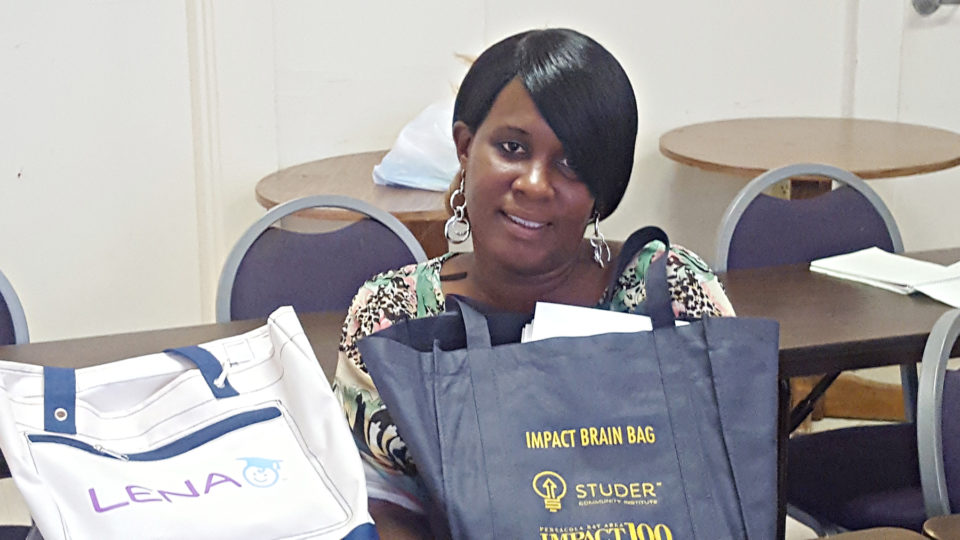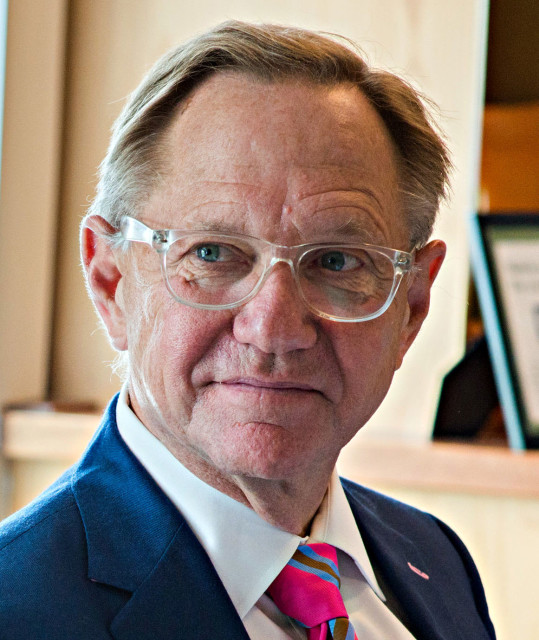Building stronger brains one baby, one parent at a time
- September 11, 2017
- / Reggie Dogan
- / education

Just as a child needs a certain amount of healthy food for physical growth, that same child also needs a healthy dose of language for brain development.
Words are food to a baby’s brain. The more words a child hears in the first three years of life, the stronger the connections in the brain will be.
Since July, the Studer Community Institute’s Parent Outreach Program has focused on helping parents use the power they have to build their babies’ brains through words.
For one hour each week, SCI staff offers tips, training and strategies in early learning initiatives for parents of children under 4 years old in Pensacola Area Housing Commission campuses at Moreno and Attucks courts.
The ultimate goal is to reach parents with helpful ways to engage their children and build babies’ brains, and in the long run, build lives and a better community.
The one hour, once-a-week parent programs uses educational information and techniques from the University of Chicago Thirty Million Word Initiative and LENA Start, emphasizing the key component of the three T’s: Tune in, Talk to and Take turns.
SCI staff also builds lessons and activities from early learning curricula, textbooks, websites and other sources that focuses on using language to help parents help their children reach developmental milestones.

One session, for example, explained the impact of toxic stress on brain development and the various ways to prevent and minimize stressful situations that cause harm and adversity in children’s lives.
Another session showed parents the various ways to use outside activities to incorporate language and encourage talk to increase brain development in creative and fun ways.
We know that most parents have the ability to talk, interact and engage with their children in daily encounters and activities. This simple but crucial task is at the heart of the Parent Outreach Program. We are using and building on those important principles in our programs in Area Housing campuses with the parents to use at home with their children.
We could tell you how much of an impact SCI has made since the program’s implementation, but it is more effective and compelling to hear directly from the participants how the Parent Outreach program has impacted families and made a difference in the lives of parents and their young children.
After a session on Thursday, Sept. 7, with Attucks Court parents at the Fricker Resource Center, Brittany Jones wanted to find out whom to thank for bringing the program to them.
“How do we thank the people who gave us this program?,” asked Jones, 27, a mother of four, the youngest 4 months old. “You guys are a blessing.”
She continued: “You give us something to do with our kids. I gladly thank you for giving us advice on being better parents. It has brought me closer to my kids and Lord knows I need help with my 1-year-old. I gladly appreciate this program. It’s been a great experience.”
Shauniece Windsor, 26, a mother of three, attends the Moreno Court program. She plans to attend Pensacola State College and get a degree in business. In the meantime, Windsor’s using the parent program to become a better mother and help her children become better students in school.
“The atmosphere is good and I learn a lot,” she said. “I do a lot of the activities I learn in class at home and being around the people in the program is fun.”
Dayon Hestle, 28, a mother of five in Moreno Court, said she learned how to communicate more with her children.
“When we’re eating, I let my baby know that he’s eating,” Hestle said. “When we’re in the car or outside, I’m always showing them different things and talking about the things we see, the different colors, shapes and sounds. I’ve learned so many different ways to talk to my baby.”
Pam Evans is a grandmother who helps in rearing her grandchildren. She’s been a regular participant in the Moreno Court program.
“I remember talking to my son who’s now in the military,” Evans said. “Now, I talk all the time and read to my grandchild. I read so much that he started sleeping with the book.”

Tammy Barge joined the Parent Outreach Program at Moreno Court from the start in June and has been one of the most fervent ambassadors and recruiters for the program:
“I started reading to my 2-year-old, which I wasn’t doing before,” said Barge, 37, a mother with four children and two under 4 years old. “You all have taught me not to yell so much because it’s toxic. I’m less agitated. I thought I had patience but you all taught me that I can have more.
“Now, I’m working on incorporating dinner time talk with my family to use more words and help build stronger brains for my babies and bonds with my family. I thank you all for teaching me something new every week.”
It’s never too early to start talking and reading to a baby as research shows that parents can have a positive impact on their child’s language and cognitive development in the first year.
We know that parents are their child’s first teacher, and if we are to have any success in building better babies, we have to reach parents to help them become the best first teachers they can be for their babies’ earliest years and beyond.
By building relationships with parents and families and creating partnerships with agencies and organizations and childcare providers, we want to continue giving parents the training and the tools to aid in building their babies brains, which ultimately builds a life and builds a community.
 CivicCon launches with a look at good growth in cities
CivicCon launches with a look at good growth in cities
 SCI debuts commercial on Early Learning City
SCI debuts commercial on Early Learning City
 Entrecon: World class speakers and an opportunity to sharpen skills
Entrecon: World class speakers and an opportunity to sharpen skills
 PYP Quality of Life survey 2017
PYP Quality of Life survey 2017
 EntreCon Pensacola 2016: A look back
EntreCon Pensacola 2016: A look back
 Leadership tip: getting better employee takeaways
Leadership tip: getting better employee takeaways
 Leadership tip: be interested instead of interesting
Leadership tip: be interested instead of interesting
 Leadership tip: delivering difficult messages
Leadership tip: delivering difficult messages
 Brain Bags boost Arc, Early Childhood Court programs
Brain Bags boost Arc, Early Childhood Court programs
 Quint column: Why mentorship matters
Quint column: Why mentorship matters